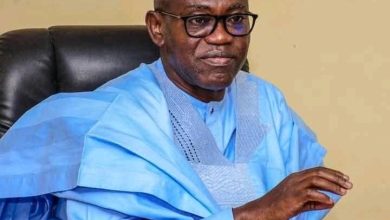The Protests In The North: A Deeper Look -By Mogaji Wole Arisekola

If you believe that last week’s violent riots in the North were aimed at President Ahmed Bola Tinubu, you might be what we in the Southwestern part of Nigeria refer to as “Mugun” or politically naive.
For some time now, protests have been erupting in the Southwest, often accompanied by attacks on government facilities. Unlike in the South, where protests frequently center around governmental policies, the unrest in the North has historically been rooted in religious sentiments. However, this recent surge in violence, which resulted in the destruction and vandalization of properties worth billions of Naira in cities like Kano, Kaduna, and Maiduguri, seems to indicate a shift in the motivations behind these protests.
It was a week of rage, fueled by hopelessness and desperation, with young protesters taking to the streets in a display of anger that many believe was a coordinated effort to remove certain politicians and settle scores within the opposition parties. The chaos exposed the vulnerability of several political figures, many of whom had to be whisked away in vehicles when the attacks began.
Perhaps the day of reckoning is approaching faster than anticipated, and it might arrive sooner than we think. The Northern region of Nigeria is currently grappling with an overwhelming number of illiterate youths. These young people, with little or no formal education, lack the certificates that would allow them to secure decent jobs, and they are without strong political or religious leaders to guide them. They are scattered across the country, often seen in front of houses or roaming the streets, a visible sign of a deeper societal issue.
If you hire a single guard from the North, you might soon find that eighteen others have joined him in the same house. This is a common phenomenon in major cities like Abuja, Kaduna, Lagos, and Kano, where young, untrained, and uneducated boys are everywhere. As Nigeria’s population continues to grow, our economy seems to be sinking deeper into crisis.
Who will save the North—and indeed Nigeria—from this path of self-destruction? It is frighteningly easy to recruit idle hands into criminal activities and to gather large followings for nefarious purposes. Given the vast population of uneducated youths in the North, it will be an uphill battle to crush insurgency and banditry. The billions of Naira spent on arms and ammunition may ultimately prove futile if the root cause of the problem—uncontrolled population growth and lack of education—is not addressed.
The North is sitting on a time bomb, and the rest of the country must remain vigilant. Any provocation could trigger a chain reaction that would lead to the total destruction of Nigeria as we know it. The signs are clear for any right-thinking Nigerian: we cannot afford to sleep with our eyes closed. The danger is real, and if we do not take immediate action to educate and control the population, the coming years could be disastrous for the entire nation.
Nigeria is in trouble, and we must act now to steer the country away from the brink of disaster. We need a comprehensive strategy that goes beyond mere security measures. Investing in education, creating job opportunities, and implementing effective population control measures are crucial steps that must be taken to address the root causes of the unrest in the North.
Moreover, the government must engage with community leaders, religious leaders, and other stakeholders to create awareness about the dangers of unchecked population growth and the importance of education. By doing so, we can begin to dismantle the conditions that breed violence and instability in the region.
The private sector also has a role to play in this effort. Businesses can contribute by providing skills training and employment opportunities for young people in the North. This will not only help to alleviate poverty but also reduce the appeal of criminal activities as a means of survival.
Civil society organizations must also step up their efforts to promote civic education and raise awareness about the importance of peaceful coexistence. By fostering dialogue and understanding between different communities, we can help to build a more cohesive and resilient society.
In the long run, we must also address the structural inequalities that have contributed to the marginalization of the North. This includes improving access to basic services such as healthcare, education, and infrastructure. By doing so, we can begin to close the gap between the North and other parts of the country and create a more balanced and equitable society.
In conclusion, the recent protests in the North are a wake-up call for the entire country. They have exposed the deep-seated issues that have been festering in the region for far too long. If we do not take immediate action to address these issues, the consequences could be catastrophic for Nigeria as a whole.
It is time for all Nigerians to come together and work towards a common goal of peace, stability, and prosperity for our country. The road ahead will not be easy, but with determination, commitment, and collective effort, we can overcome the challenges and build a better future for generations to come.
Mogaji Wole Arisekola writes from Ibadan.








